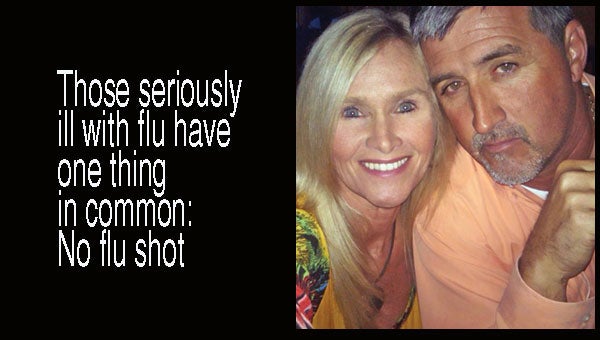Watts battles H1N1 at UAB
Published 12:00 am Friday, January 24, 2014
An Andalusia man is currently fighting the H1N1 virus with the help of the news-making, repurposed heart-lung bypass machines at the University of Alabama at Birmingham hospital.
So far, nearly two-dozen, severely ill flu patients have received a chance for another breath thanks to the last-resort therapy employing the ECMO.
The ECMO, short for extracorporeal membrane oxygenation machine, was first developed for use in heart bypass surgery and what it does is give the organs a rest and allows the body to heal.
It was used to help Shelline Watts’ husband, Teddy, after they each came down with “the crud” nearly simultaneously after the New Year.
“We just assumed it was an everyday case of cold or mild flu and took the usual concoction of Dayquil, Nyquil, Motrin and Gatorade,” Watts said. “The entire weekend was spent in bed with fever, cough and the body aches.”
Watts said the couple tried to get a doctor’s appointment, but were unsuccessful. The doctor called in some medicine for her husband.
“He took it for 48 hours and still didn’t feel better,” she said. “He went in to see the doctor and got two shots. He was still no better.”
Soon, the couple had to make a trip to the emergency room, and Mr. Watts was admitted for pneumonia.
“There we were, 48 hours later and he was no better,” Watts said. “A lung doctor came and saw him and changed his meds, but by Sunday, he was worse and had to be life flighted to Baptist in Pensacola.”
Watts said as soon as her husband was admitted to the Florida hospital, doctors told them they would be transferred to UAB.
“They told us there was a machine that could better help Teddy,” she said. “That night they told us he tested positive for Type A flu, double pneumonia and then on Monday, H1N1.”
The next night, Mr. Watts was flown via jet to UAB.
“When I arrived they already had him on the ECMO machine, and his color was already better,” Watts said. “The machine by-passes the lungs while they heal and your body regains strength. As his lungs slowly heal, they lower the settings on the machine, and once his vitals are stable at the new settings they will continue to decrease them until he is stable on his own “
Thursday night, Watts said Teddy had been removed from the ECMO machine. Earlier in the day, doctors performed a a tracheotomy so that her husband could come off the ventilator.
“Dr. Diaz has been wonderful, and I don’t know what we would have done without that machine,” she said, speaking of the head of the UAB ECMO program.
Diaz described the process as “complicated and last-resort procedure.” Patients undergoing ECMO treatment can remain in intensive care for several weeks – which is what the Watts family is facing now. Once released from the ICU, her husband will have to go to a rehab unit, Watts said.
Despite the fight ahead, the Watts family considers themselves lucky.
“We are right across the hall from the wife of the paramedic from Santa Rosa County who died from H1N1,” she said. “I have had several conversations with her parents. They, too, still have days where they just can’t believe what’s happening just as I do, so please, I ask that everyone keep her and her family, as well as the others in the unit, in your prayers too.”
UAB has seven ECMO machines and has treated patients from across the state and hard-hit areas, including the Florida and Alabama Gulf Coast region.
“ECMO is not a cure, but it is a way to support some of these very critically-ill patients who are failing conventional medical therapy, failing mechanical ventilation,” said Diaz, associate professor in the Division of Pulmonary, Allergy and Critical Care Medicine.
Health officials say the current string of flu is affecting young and middle-aged adults the most. The best way to prevent this is to receive a flu shot.
Watts echoed that advice. The one thing all these cases have in common is that no one got a flu shot, she said.






